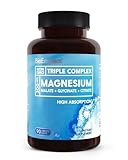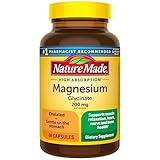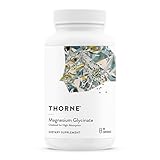Exercise Daily _ Best Magnesium For Muscle Tension Relief
Muscle tension can be a debilitating condition, affecting athletes and everyday individuals alike. With the rise in popularity of dietary supplements, many people are turning to magnesium as a potential solution for muscle tension relief. However, the question remains: which form of magnesium is the best for alleviating muscle tension? This article aims to dissect the various forms of magnesium, the science behind its efficacy, and common misconceptions surrounding its use.
Understanding Magnesium and Muscle Tension
Magnesium plays a crucial role in muscle function. It is involved in over 300 enzymatic reactions in the body, including those responsible for energy production and muscle contraction. When magnesium levels are low, muscle cramps and tension can occur. This has led to the belief that supplementing with magnesium can help relieve muscle tension.
The Science Behind Magnesium
Magnesium is essential for maintaining muscle health. It aids in the regulation of calcium levels in muscles, which is necessary for muscle contraction and relaxation. According to a study published in the Journal of Nutrition, magnesium deficiency can lead to increased muscle tension and spasms. Furthermore, researchers at the National Institutes of Health have found that magnesium supplementation can improve muscle function and reduce the risk of cramps.
Despite these findings, the effectiveness of magnesium supplementation is still a topic of debate. Some argue that the body can obtain sufficient magnesium through a balanced diet, while others contend that supplementation is necessary for those with higher needs, such as athletes or individuals with certain health conditions.
Different Types of Magnesium Supplements
There are several forms of magnesium available on the market, each with unique properties. Understanding these differences is essential for choosing the right supplement for muscle tension relief.
- Magnesium Citrate: Known for its high bioavailability, magnesium citrate is often recommended for those looking to alleviate muscle cramps and tension.
- Magnesium Glycinate: This form is bound to the amino acid glycine, making it gentle on the stomach and effective for muscle relaxation.
- Magnesium Oxide: While this form contains a high amount of elemental magnesium, it is less bioavailable and may cause digestive discomfort.
- Magnesium Malate: Often recommended for muscle pain and fatigue, magnesium malate is believed to help with energy production.
- Magnesium Threonate: This newer form is touted for its ability to penetrate the blood-brain barrier, potentially aiding in cognitive function and stress relief.
When selecting a magnesium supplement, it is crucial to consider individual needs and tolerances. While some forms may be more effective for muscle tension relief, others may be better suited for different health benefits.
What Most People Get Wrong About Magnesium
There are several misconceptions regarding magnesium supplementation that can hinder its effectiveness. One common mistake is assuming that all magnesium supplements are created equal. As highlighted earlier, the form of magnesium significantly impacts its absorption and efficacy.
Another misconception is that dietary intake alone can meet magnesium needs for everyone. While a balanced diet rich in magnesium-containing foods—such as leafy greens, nuts, and whole grains—can suffice for many, certain populations may require supplementation. This includes athletes, pregnant women, and individuals with gastrointestinal disorders that impair absorption.
Choosing the Best Magnesium for Muscle Tension Relief
To determine the best magnesium for muscle tension relief, consider the following factors:
- Bioavailability: Choose forms like magnesium citrate or glycinate for better absorption.
- Personal Tolerance: Some individuals may experience gastrointestinal discomfort with certain forms, such as magnesium oxide.
- Specific Health Goals: If the primary concern is muscle tension, magnesium citrate or glycinate may be best. For energy production, consider magnesium malate.
Consulting with a healthcare professional can provide personalized recommendations based on individual needs and health conditions.
Can Magnesium Cause Dizziness and What are Side Effects
Magnesium has long been touted as a natural remedy for everything from anxiety and sleep troubles to muscle aches and pain. And while magnesium is certainly beneficial, it’s not without its downfalls. In this blog post, we will explore one of those downside- magnesium can cause dizziness and other side effects. We will also provide some tips on how to minimize the chances of experiencing such side effects, should they occur. So whether you’re taking magnesium supplements or not, read on to learn more about the potential risks.
Evidence Supporting Magnesium Supplementation
Research supports the use of magnesium for muscle tension relief, although results can vary. A meta-analysis published in the American Journal of Clinical Nutrition found that magnesium supplementation significantly reduced muscle cramps among pregnant women, suggesting its potential benefits in muscle relaxation.
Furthermore, a study in the European Journal of Nutrition indicated that magnesium supplementation improved exercise performance and reduced muscle soreness in athletes. These findings highlight the importance of magnesium in muscle health and recovery.
Counterarguments: Is Magnesium Necessary?
While many advocate for magnesium supplementation, some argue against its necessity. Critics often point to the fact that most people can meet their magnesium needs through diet alone. According to the National Institutes of Health, only a small percentage of the population is truly magnesium deficient.
This raises the question: is supplementation overhyped? Proponents argue that the demands of modern lifestyles—stress, poor diet, and intense exercise—can lead to suboptimal magnesium levels, making supplementation beneficial for many. Ultimately, the decision to supplement should be based on individual circumstances and health status.
Magnesium-Rich Foods
For those who prefer to obtain magnesium through diet, here are some magnesium-rich foods to consider:
- Spinach
- Almonds
- Black beans
- Avocados
- Whole grains
Incorporating these foods into your diet can help maintain adequate magnesium levels and support muscle health. For more information on nutrition, check out our comprehensive guide on nutrition.
Magnesium Recipe: Relaxing Magnesium Drink
Here’s a simple recipe for a relaxing magnesium drink that can help alleviate muscle tension:

Ingredients:
- 1 cup warm water
- 1 teaspoon magnesium citrate powder
- 1 tablespoon honey (optional)
- Juice of half a lemon
Instructions:
- In a glass, mix the magnesium citrate powder with warm water until dissolved.
- Add honey and lemon juice for flavor.
- Stir well and enjoy before bedtime for relaxation.
This drink can be a soothing addition to your evening routine, promoting relaxation and muscle recovery. For more wellness tips, visit our wellness section.
Conclusion: The Best Magnesium for Muscle Tension Relief
In conclusion, the best magnesium for muscle tension relief largely depends on individual needs and preferences. Magnesium citrate and glycinate are often recommended for their high bioavailability and effectiveness in muscle relaxation. However, it is essential to consider dietary sources and consult with a healthcare professional before starting any supplementation. Ultimately, while magnesium can play a role in alleviating muscle tension, it is not a one-size-fits-all solution. For optimal health, maintain a balanced diet, manage stress, and incorporate regular exercise into your routine. For more on exercise, check our resources on exercise.
- Journal of Nutrition
- National Institutes of Health
- American Journal of Clinical Nutrition
- European Journal of Nutrition
- National Institutes of Health
Eat daily, sleep daily, exercise daily.











